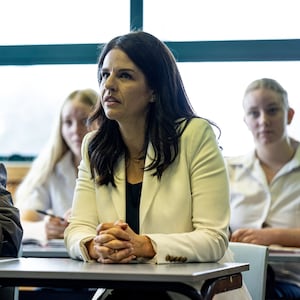Politics
Education Minister Erica Stanford Announces NCEA Overhaul

Erica Stanford, New Zealand’s Education Minister, has made headlines this week with the announcement of a significant overhaul of the National Certificate of Educational Achievement (NCEA). The government plans to replace the current qualification system for secondary schools, a move that has garnered minimal opposition. This decision marks a major shift in the educational landscape of New Zealand, particularly notable given that the National Party entered the 2023 election without specific promises regarding NCEA reforms.
The announcement comes after Stanford’s commitment to “revitalise” NCEA at the beginning of the year. Despite the lack of prior pledges, her decisive action has sparked discussions among educators, parents, and stakeholders. While the consultation period for the changes is relatively short at six weeks, the reaction has been largely positive, with many expressing relief at the potential for reform.
One of the primary concerns raised by critics has been the proposed elimination of exam marking responsibilities for teachers. Stanford has suggested that artificial intelligence could assist in this area, a notion that has prompted debate about the feasibility and implications of such technology in educational assessment. Nonetheless, these are procedural matters that can be addressed as the implementation timeline unfolds, which is set for 2028.
The lack of significant dissent surrounding this substantial change can be attributed to two key factors. First, there is a pronounced lack of confidence in the existing NCEA system among various stakeholders, including parents, teachers, and employers. Many have long criticized the current structure for its complexities and perceived inadequacies in preparing students for future challenges.
Secondly, Stanford’s confidence and proactive approach to drive change have played a critical role in the smooth transition towards a new qualification framework. Her ability to navigate the political landscape and rally support for reform has been instrumental in minimizing opposition.
As New Zealand moves towards this new educational chapter, the focus will shift to how these proposed changes will be received by the wider community. With educators and families eagerly awaiting further details, the coming weeks will be pivotal in shaping the future of secondary education in the country.
-

 World4 months ago
World4 months agoTest Your Knowledge: Take the Herald’s Afternoon Quiz Today
-

 Sports4 months ago
Sports4 months agoPM Faces Backlash from Fans During Netball Trophy Ceremony
-

 Lifestyle4 months ago
Lifestyle4 months agoDunedin Designers Win Top Award at Hokonui Fashion Event
-

 Entertainment4 months ago
Entertainment4 months agoExperience the Excitement of ‘Chief of War’ in Oʻahu
-

 Sports4 months ago
Sports4 months agoLiam Lawson Launches New Era for Racing Bulls with Strong Start
-

 World5 months ago
World5 months agoCoalition Forms to Preserve Māori Wards in Hawke’s Bay
-

 Lifestyle4 months ago
Lifestyle4 months agoDisney Fan Reveals Dress Code Tips for Park Visitors
-

 Health4 months ago
Health4 months agoWalking Faster Offers Major Health Benefits for Older Adults
-

 Politics4 months ago
Politics4 months agoScots Rally with Humor and Music to Protest Trump’s Visit
-

 Top Stories5 months ago
Top Stories5 months agoUK and India Finalize Trade Deal to Boost Economic Ties
-

 Health2 months ago
Health2 months agoRadio Host Jay-Jay Feeney’s Partner Secures Visa to Stay in NZ
-

 World5 months ago
World5 months agoHuntly Begins Water Pipe Flushing to Resolve Brown Water Issue









